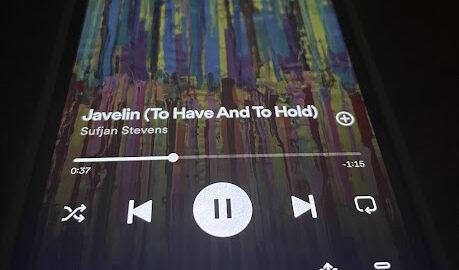In an Oct. 6 Instagram post, indie-folk artist Sufjan Stevens dedicated his new album, “Javelin,” to his partner, Evans Richardson, who passed away in April.
It would be easy for someone who has lost some so recently to be bitter and resentful. Despite this, Stevens’ post is a call to action to love intensely and to savor each moment. He ends his message with a line from Psalm 118 — “This is the day the Lord has made. Let us be glad and rejoice in it.”
The dedication perfectly encapsulates the message of “Javelin.” Stevens captures a hopeful optimism in the face of difficulty through lush, expansive production paired with spiritual and natural imagery ingrained in his lyrics.
The opening track, “Goodbye Evergreen,” begins as a solemn, intimate farewell to a lover. He comments on the inevitable end of all things, lamenting how “everything heaven-sent must burn out in the end.”
This is the first of many religious images present in the album. Only a piano accompanies Stevens initially, but over the course of the song, the production swells into a rhythmic and pounding chorus. Finally, just as it started, the song fades to just a quiet flute.
Following “Goodbye Evergreen,” “A Running Start” is a tone shift. More upbeat than the previous song, it tells the story of a fledgling love.
Stevens uses vivid natural imagery to describe the anticipation and excitement in a new relationship. Lines such as, “kiss my bracelet and my shoulder blades” and “throw your arms around my heart” express such intimacy. Once again, the production is expansive and rhythmic with a constant choral presence in the background driving the song forward.
Stevens once again pivots the mood on “Will Anybody Ever Love Me?” Here, he is frustrated and yearning, demanding to know when he will find love that is unconditional and “without grievance.” This is particularly impactful considering the proximity to the passing of his partner with which he released this album.
The production themes from the previous songs continue here, but I found the instrumental to be borderline jarring at times, specifically halfway through the song. But, this takes little away from the lyrics and emotion of the song.
The next two songs, “Everything That Rises” and “Genuflecting Ghost” are the most spiritual of the album. Both songs contain direct religious references. On “Everything That Rises,” the lofty production and ethereal imagery evoke the feeling of transcendence. Stevens appeals to Christianity with the line, “Jesus lift me up to a higher plane, can you come around before I go insane?” in order to escape the difficulty of everyday life.
“Genuflecting Ghost” describes absolute devotion to either a deity or a lover. The distinction is blurry, perhaps to express his love on the level of worship. Once again, the production builds over the course of the song with lush backing vocals, an arpeggiating guitar line and dramatic swells.
The religious imagery continues on “My Red Little Fox,” a beautiful expression of love and passion. Stevens describes being kissed “with the fire of the gods” and makes numerous references to Pentecost, the celebration of the descent of the Holy Spirit. The instrumental begins with an understated piano and builds with echoing choral vocals. For me, this is the standout track of the album, with its stunning production and striking imagery.
“So You Are Tired” and “Javelin (To Have And To Hold)” contend with the challenge of love and relationships. On “So You Are Tired,” Stevens sings of the feeling of watching someone fall out of love as problems arise. He sounds insecure as he asks, “Was it something I said or some kind of joke?” and “Was it really all just for fun?” Particularly impactful was the line, “I was a man still in love with you, when I already knew it was done,” describing the purposeful blindness love can cause.
The title track, “Javelin (To Have And To Hold)” describes how we sometimes accidentally hurt those we love. He uses an extended metaphor of throwing a javelin at someone. The instrumentals are more understated than the previous songs, placing more emphasis on the lyrics, which are among the best of the album.
“Shit Talk” is a response to the conflict of the previous two songs. Here, Stevens has had enough of the fighting and feels it is no longer worth it. Though he still feels much for the person he is talking about, he sings, “I will always love you, but I cannot live with you” and “our romantic second chance is dead.”
Overall, the song conveys the difficulty in letting someone go, though it is the right thing to do. The production on this song is once again impressive, with dramatic swells into the choruses whilst the verses pull back and focus on the lyrics.
The album ends with a song that largely echoes the sentiments of Stevens’ dedication post. On “There’s A World,” the mood becomes much more optimistic. Here, he calls upon listeners to revel in the feeling of being alive and to embrace individuality. The song ends with the lines, “All God’s children in the wind, take it in and blow real hard,” calling listeners to take advantage of being alive. The production and vocals on this song are stunningly ethereal, the harmonies on the chorus goosebump inducing.
“Javelin” is among the best of Sufjan Stevens’ portfolio. He captures such raw emotion through piercing lyrics that incorporate vivid natural images and religious references. The production is striking yet balanced, reaching climatic highs whilst leaving space for the lyrics to pierce. He contends with the difficulty of life yet remains optimistic. Despite the hardships he’s faced, he challenges the listener to savor life and to love fiercely.


